Alumni Letters from Lockdown
Alumni worldwide reflect on their experiences of lockdown amid the global COVID-19 pandemic. Hear from alumni from Qatar to Chile, Zambia to Greece and Australia to Japan.
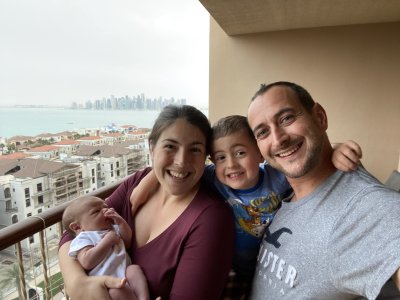
Katherine Milton (née Bennett, Clare, 2005)
I moved to Doha in 2013 and teach here with my husband at an international school. Our baby - Bertie - was born on 9th March; the day before Qatar went into lockdown. His whole life has been spent in the cocoon of our home, with us and our four-year-old, Edward. Now the temperatures are climbing (high of 40 today) and face masks are mandatory, making it harder to go outside and bike ride without stabilisers (!). My maternity leave ends after Eid so I will begin my own e-teaching experience - I'm apprehensive but so excited to reconnect with my students. We have our activity "rota" - the baking, the family zooming, the cooking, the den, the film, the paddling pool, the painting...but now we are learning to shift down a gear and enjoy our baby Bertie's cuddles before we have to share him with others!
From Doha with love
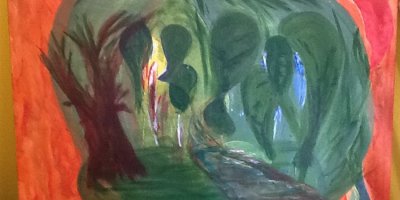
Mike Hogan (Downing 1971)
This solitary refinement has opened new spaces in my head, given me new rhythms and offered possibilities to live differently and better. It has deepened and re-opened feelings of loss and intensified my love for important others who I am separated from. It has intensified my sense of privilege and challenged me to work harder and to engage with others in order to sustain the good that Covid-19 has offered us and address the evils and inequalities which we turn a blind eye to. It has made me anxious, grateful and cognisant of our fragility. I hope it will dismantle our complex social fantasies and delusions, and invite us to live more real lives.
Mikki Staermose (Newnham 1951)
Lockdown in perspective
We called it quarantine. It happened many times for mumps, measles, chickenpox and more. We were kept at home; no TV or computers, and phone only for emergencies, but plenty of books. Children's hour on the radio was 5-6pm. I missed another month when my brother had scarlet fever, and then I had no-one to play with. Did we mind? We had never known anything else. One exception was Rubella when girls were sent to play with infected children to protect them during later pregnancy. When we did get to school we missed many hours sheltering in the cellars during air raids. That was our ‘normal’.

Natasha Faccini (née Awais-Dean, Jesus 2001)
In all honesty, it's been tough. Between my husband and I both working full-time and juggling remote schooling for our young daughters (aged 9 and 5), who each have daily timetables for school, it's certainly been a challenge. I think the emotional toll has affected us all too, as we’ve (at least me and my daughters) have had moments when we’ve been weepy. On the positive, we've obviously spent so much time together and seeing how mature and smart my girls are has been lovely. We’ve been able to explore our local area more on foot - taking walks further afield from our village. I’ve tried some new things: glossing all the woodwork in our hallway and, more recently, fine-tuning my hairdressing skills on my husband and daughters – not a bad end result! This whole experience has definitely made me value what’s important in life.
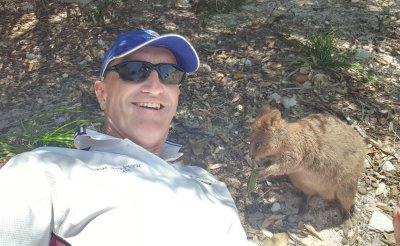
Stuart Crisp (Fitzwilliam 1991)
Survivor Guilt
Paradoxical disappointment at dodging the bullet, but not getting to put all our preparation to the test. Such is Covid in rural NSW. A slow trickle of adults have been seen in our newly-separated emergency department Hot Zone. Not a single positive child has tasted the luxury of the paediatric hot zone, rapidly put together in an area purloined from the adjacent CAMHS in-patient unit. Massive changes designed and realised by clinicians working long hours, collaborating in an unprecedented way. Hospital admin struggled to keep up with the 'let's get this done' attitude of clinicians terrified by the impending tsunami and the horror stories from colleagues and friends overseas. Twas not to be - the tyranny of distance saved us. Wondering where all the kids have gone, as I stare at empty beds - social distancing has delayed our bronchiolitis and flu season! The Lucky Country, indeed…
David Patey (Selwyn 1976)
My wife, Sarah Brown (Newnham 1975) and I opened Heathfield Student Community Home in Norwich in 2017. We normally have 44 students living here, and we live on site. Now we are down to just 17 students living a semi-distanced communal life. Sarah continues to edit and proofread, and I have spent a lot of time on maintenance. The site is 1.4 acres and the building includes many shared spaces, so lockdown is less oppressive than it might be. We offered our residents a choice between staying on, ending their tenancies early, or paying half-rent in the hope of returning later in the year. For next year we have reduced the rent, passing on the subsidy we have received through taking a Bounce Back Loan. We are still useful and still solvent, and that is grounds for thankfulness.
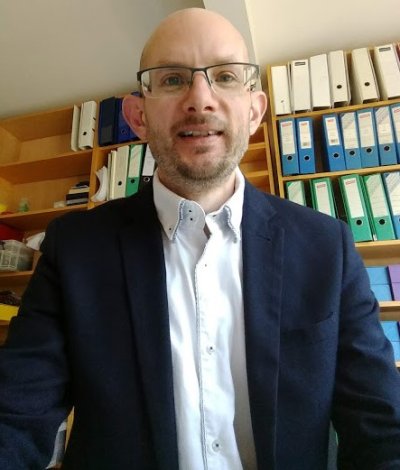
Christopher Wilkinson (Wolfson 2008)
As overseer of the Equipment Sharing Project, I was tasked with speaking directly to university lab and equipment managers to see how we could support the Government’s CV19 test facility to ensure they had sufficient quantities of reagents and equipment, and to help source equipment for the local collaborative response between the University of Cambridge, AstraZeneca and GSK based at the Anne McLaren Building. As well as publicising funding-support and news via the publically accessible website that operates in parallel, I used the equipment database much like anyone would; searching for equipment and creating lists of primary contacts with whom to connect. Within four days (and over the Easter Weekend, I hasten to add) the offers of equipment exceeded our original request and allowed us to develop contingency plans for back-up equipment should the need arise. I was also able to connect organisers here with PPE manufacturers in China through friends of the Institute for Manufacturing’s ISMM44 cohort who went above and beyond to help us in our moment of need. On a not-so-directly-work-related-note, having signed up to the Love-to-Ride scheme in March, one of the WFH highlights for me has been emulating my daily bicycle commute to ensure I stay fit. I’ve since cycled 433 miles and have really enjoyed the quietness of the roads during lockdown.
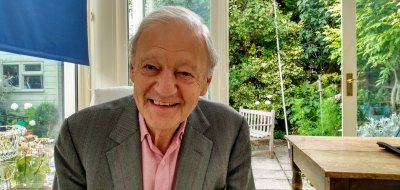
Christopher Balfour (Trinity College 1957)
This time has taken me back to 1944… It was a wondrous Spring yet all around, as a child in the Meon Valley, in their tents, were soldiers, about to go to their deaths on or after D-Day. So, it is again, peace and horror intertwined as we walk.
No motorway roar, no planes to Southampton. Will we learn, from all this horror, that epidemics and war are always part of human experience? Mother Nature must be respected. Infinite expansion isn't possible on a finite planet.
Meanwhile, the days are fully occupied stripping and re-painting the chassis of a 1970 car and finding new insights when re-reading books not read for 30 years. We work on the allotment and re-double litter picking! A daughter and a grandson are both Doctors so well aware of present realities, just fortunate that so far not affected.

Keren Turton (Magdalene 2019)
I started my postdoc at Queen’s University Belfast late last year, and had a few months of experimental work before lockdown began. Now I’ve become a stay-at-home scientist. Like many of my peers, I'm hurriedly learning bioinformatics and getting around to all the papers I’ve been meaning to read. Last year, I did an MPhil in History and Philosophy of Science and the timing has been serendipitous, because the humanities research skills I developed have served me in lockdown. The MPhil helped me become a more strategic reader and writer. It inculcated the self-discipline required for working from home, and the perseverance to do sustained stretches of staring at words. I'm aware of how fortunate I am that I enjoy the new mode of work and that I still to have a salary, despite doing a very different job than the one I was hired to do.
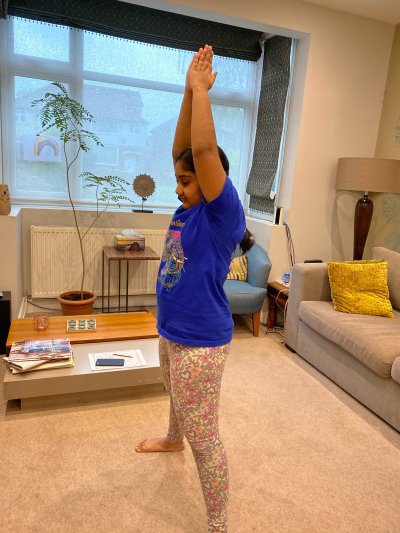
Pooja Aggarwal (Queens' 1999)
My husband displayed severe symptoms of COVID 19 and so for about 4 weeks, we were battling that, in isolation, with two children, working from home and with a disabled family member. We have established a new routine balancing home schooling and work alongside a rekindled love for cooking, reading, board games, zoom calls and taking advantage of all the free online resources. The children love us all eating together and talking about things like the impact Covid 19 is having on the environment. I have a 'virtual drop in' session every week with my team and hold all meetings online. In these unprecedented times, regular communication is key. As a family, we are all learning a lot about ourselves and I am relishing this time which may never come again to re-assess and re-set.
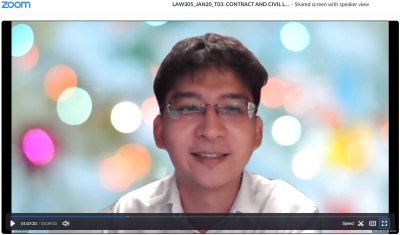
Ben Chester Cheong (Churchill 2014)
I am a Lecturer of Law at the Singapore University of Social Sciences. Life under lockdown has been surreal. I had to get used to a new normal, that being teaching students online using Zoom, including dealing with student consultations, all within a very short period of time. The Zoom platform has been facilitative and has enabled the teaching of law to continue as per normal. Students I taught found the sessions interesting. I have been more generous with my time online and I think students appreciate that.
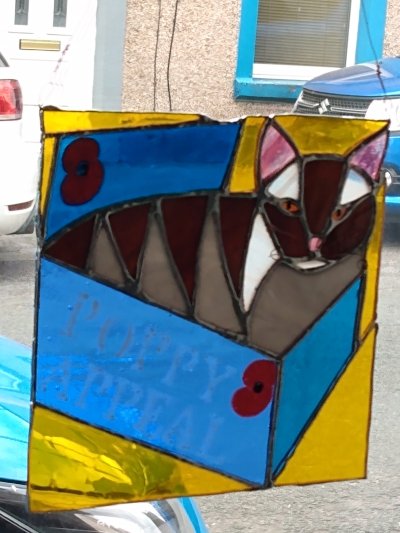
Judith Varley-Evans (Newnham 1988)
As an extrovert introvert, I've found it liberating not having to have social contact which puts me in my happy place. I just found my levels of anxiety dropped as soon as social isolation was called for. It's been a very creative time for me. For a long time, I've felt an artistic block to making copper foil glasswork but I've started again. I've cocooned, enjoying baking and gardening. My old neighbour next door has benefitted from chats over the fence while I'm outside and now counts my elderly Siamese cat as a friend too!
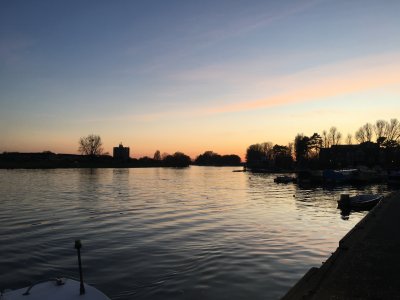
Jasmine Childs (Trinity Hall 2017)
Life under lockdown is said to be doom and gloom, fuelled with marital spats and feverish children. However, I have found lockdown to be a liberating experience. I can relate to tales of early academics who found respite and clarity in isolation and had time to devote to thinking and developing research. I am an academic at another UK higher education institution, and rarely have the time to look at my research let alone be creative! My research looks at how we can improve mental health and wellbeing by adopting a mind-body approach. During lockdown, I have set up my home routine reminiscent of that of an ashram - meditation sessions, online yoga classes, cooking vegetarian recipes and drinking chai. The mental peace this achieves has enabled me to start developing my ideas, which I hope will make a positive contribution to the lives of others one day.
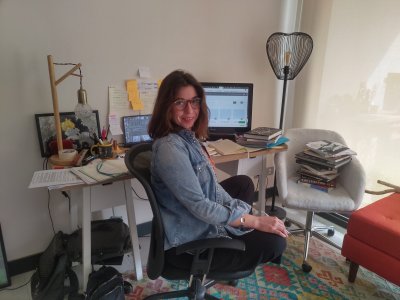
Giovanna Cottin (Newnham 2013)
During this pandemic, I am performing online teaching in Chile. I am teaching for the first time! I recently became a Professor at Universidad Adolfo Ibañez in Santiago, Chile, in January 2020. It has been extremely challenging to start as a young professor in online mode. Besides learning new online platforms, I have been pushing my creativity to engage students and enhance participation during classes. My previous teaching experience was when I did Supervisions in Cambridge, with small groups of students (1-4). Now, I have (20-24) students in a (virtual) classroom, all of them behind screens. I think this pandemic will force us to re-asses and develop novel and efficient teaching strategies, to maximize student's learning through this particular hard time. I am trying to do my best and hoping to get the most from this adverse situation, which many professors are facing around the world.
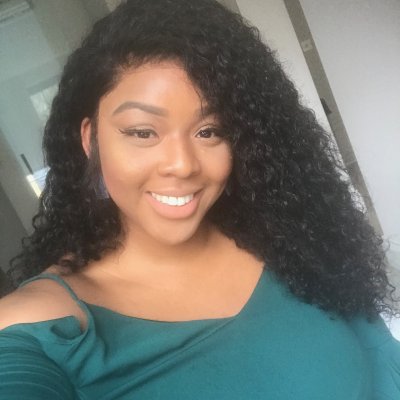
Raisa Kumaga (Hughes Hall 2015)
I am currently a trainee counselling psychologist and I provide psychological therapy to people with mental health difficulties. The swift transition from F2F to online therapy was needed to still provide the best care to people whose anxiety has increased due to the pandemic. For some of my clients, isolation and changes in mood have been constant symptoms in their lives and now this collective isolation is felt and experienced by the whole world. I have also been focusing on my research about intergenerational trauma in refugee families, lecturing and writing articles about the psychological impact of COVID-19. However, the productivity also has paved the way for rest and connection with others online and I believe I have been able to rest more than ever with beautiful walks in the park and even celebrated my birthday with my friends through a video call.
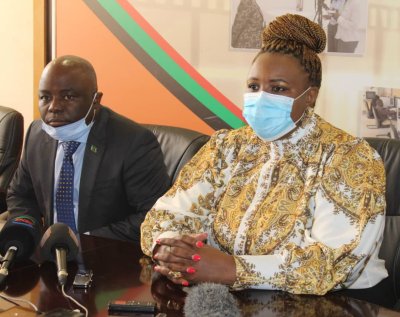
Dora Siliya (St Edmund's 1998)
The first case in Zambia was 18 March 2020. As Minister of Information and a Government spokesperson, I was in the forefront to ensure information dissemination to all Zambians. The country has been in partial lock down since 26 March. My job includes going in high density areas and speaking to citizens about wearing masks and social distancing. I contracted COVID-19, and was in quarantine from 19th May to 1 June. Now I’m back at work and sharing more information on COVID-19.
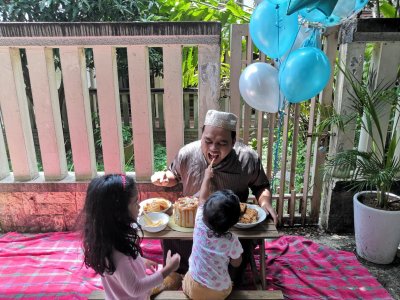
Asrif Yusoff (Hughes Hall 2017)
For us, the lockdown here in Kuala Lumpur has been a humbling lesson in appreciating the littlest things in life. The contrast of staying at home against the chaos that those working on the frontline go through is one that draws you to reflect on your values and priorities. We have also learned how to make the most of the situation. All four of us were born in the first half of the year so celebrating our birthdays in lockdown has been memorable in its own way. I’ll always remember these little parties in our backyard. My biggest takeaway from this experience is probably graduating at home. I was supposed to walk in the March congregation which has been postponed -- for a very good reason. So, we had a small ceremony over Eid. After all, all you need to celebrate is family.
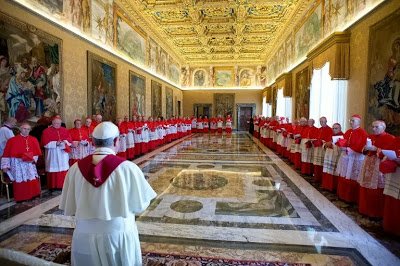
Ronald Stake (St Edmund's 1978)
In Chicago we are under restrictions as we attempt to re-open safely. I leave my apartment only for groceries and other necessities, always wearing a face mask. I retired from full-time ministry as a Catholic priest on October 1, 2019. Nonetheless, I still do part-time work from home via the internet. Like the rest of our society, our churches, schools, and offices will slowly re-open according to strict guidance developed by the Archdiocese of Chicago and approval of the State of Illinois. Today is the 94th day of my lockdown, home alone and coping. In the last two weeks I was able to work a few part-time days from my office four blocks away. I share my isolation with billions around the globe, and I pray that Providence will guide us to care for each other.
Rosemary Hollingworth (Girton 1955)
For the second time in my life I am in lockdown. In 1942 my family and I were in a Japanese internment camp in Shanghai. As enemy aliens we had had to exchange the freedom of life in rural north China for the confinement of a barbed wire surrounded compound. Now I have exchanged the Derbyshire hills for walks on suburban tarmac, once again unable to go further than my feet can take me. Now two of us are confined to one house, then five of us shared one room with 19 other people. Unlike then I am well fed and fear no bombs. I long to be with my grandchildren as my grandparents in England must have done but I'm able to keep in touch in ways I could never have imagined then.
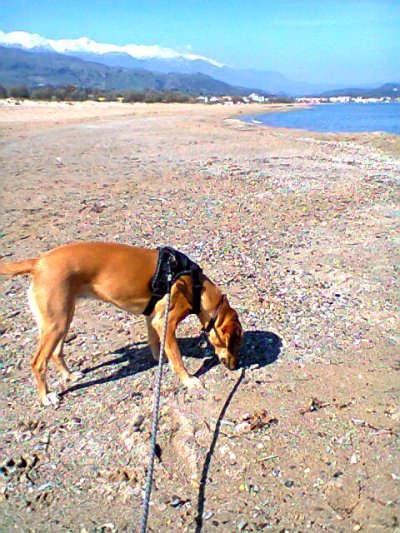
Jennifer Purves Smith (Queens' 1986)
In Crete, the number of cases of Covid 19 has been low. In fact, in the whole of Greece, there have been fewer than 200 deaths. This has been attributed to the early action taken to restrict movement, although I suspect a more realistic explanation is the strict implementation of those measures, with on the spot fines and possible arrest. There’s no question of "please do as we ask” here. As a wise man once said to me: policing by consent is all very well as long as people consent. The prospect of tourists returning will be not a moment too soon for the local economy which has taken a huge hit. However, rather selfishly, I do not miss the invading hordes of tourists. For someone who is happy with her own company, self-isolation is no hardship. Keeping fit is no problem, while work continues with computers and telephones.
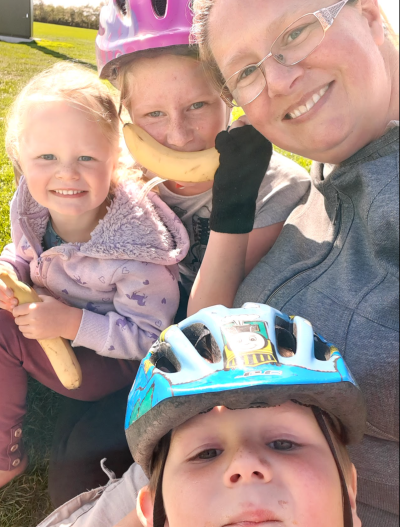
Sophie McInnes (Churchill 1999)
We've been very lucky here in New Zealand. After watching the pandemic unfold from afar, our lockdown happened very quickly once Covid-19 arrived in Aotearoa and border closures were aided by our relative isolation. During our Level 4, my husband and I tag teamed in and out of our home office, which is basically a box room but still gave enough isolation for the odd Zoom meeting. Our eldest is home-schooled anyway, but the constant presence of her twin siblings (normally at preschool) was pretty trying. Thank goodness for online learning, a cupboard full of paints and games, and a sunny garden! Now we're back down to Level 1 and almost everything is back to normal, though the littlies didn’t have a 4th birthday and big sister opted for a family bushwalk for her 13th. I really worry for friends and family back in the UK though – kia kaha, stay strong.
Bridget Rees (née Hains, Newnham 1954)
With a house full of 80 years of books, I'm getting around to the re-reading I kept them for. Nobody can come in to see the neglected housework, I know more neighbours than I ever did when they worked, and people bring me my shopping! Am I wracked by isolation? Dear hearts - that's what old age is about - bits of you get crumbly and your grandkids grow up and away. Lockdown (that time when everyone suddenly remembers to ask if we're all right?) - the future of the world may be terrible but my present - birdsong, friends, breathable air, researching nights and sleeping mornings - is not bad at all.
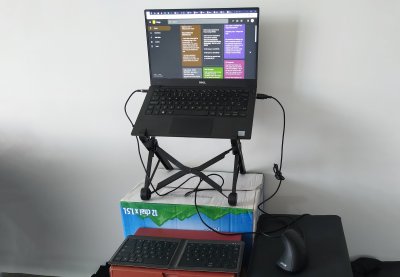
Sam Nattress (Selwyn 2008)
My experience of lockdown has been a heartening reminder of the committed entrepreneurs, scientists and creatives who are working on an existential challenge that has been eclipsed from the headlines: climate change. I do marketing and writing for environmentally positive businesses. I see every day that work continues on the most pressing issue of our times. Large corporations are sticking to their sustainability targets. Start-ups are pressing forth with new solutions. The potential for environmentally responsible growth as we emerge from lockdown is huge. So what if I’m writing from a standing desk made of cardboard boxes? What we’re doing is important. Every day I’m grateful to be surrounded by the determination to press on despite corona. It’s a motivating, humbling call to truly significant work.
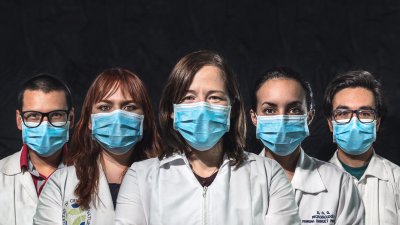
Karina Acevedo-Whitehouse (Wolfson 2001)
When lockdown began, I figured I would catch up on writing. Instead, I became part of project to detect asymptomatic carriers of SARS-CoV2 to help reduce the epidemic. We designed a highly specific test that detected even little copies of the virus at a fraction of the cost of the official test, which was extremely limited in the national health system. Together with an 83-strong team of researchers, students, and alumni, we have run more than 5,000 free tests and detected 450 positive cases. By detecting these infections early, we have helped avoid 30,000 infections of which 6000 would have needed hospitalisation and 1,080 deaths. Despite its high population-density, ours is still one of the states with fewer cases in Mexico. The experience has been overwhelming, exhausting, and rewarding. I am proud to be a part of this effort. Every life saved makes the effort worthwhile!
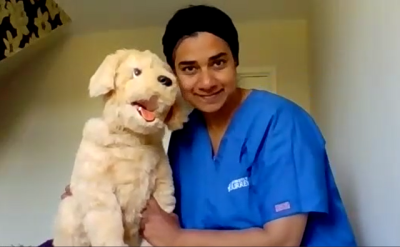
Dynatra Subasinghe (Murray Edwards 2007)
Teaching online under lock down; I am a teaching fellow in small animal practice at the University of Surrey Vet School. We were plunged into lockdown half-way in to the second semester of teaching veterinary undergraduates like all other universities. I had to teach clinical examination of a live dog online during the lockdown. Impossible task! But I was determined to teach at least the principles of clinical examination despite the constraints. I set the stage in my makeshift office at home. Used a toy dog I had bought for my children, kept it on an ironing table, set my video camera to focus on the dog and me and conducted the clinical examination through a zoom teaching session in full uniform, recreating the atmosphere in the clinic as much as possible for my students. The students said, “Probably the best online practical we've had so far!"
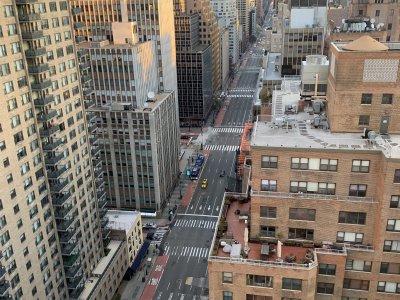
Kshanika Marini Edwards (Girton 1980)
Lockdown in New York
As a doctor, my first impulse was to help. Unfortunately, due to high risk factors such as age and ethnicity, I came to the conclusion that discretion was the better part of valour. My family in the UK persuaded me to stay indoors during this ongoing lockdown. I have spent this time reconnecting with friends and colleagues via the blessing of technology; updating my medical and technological knowledge; sorting out the lifetime of things that my parents had collected in their apartment and cooking. I only go out once a week - to the supermarket for groceries. A strange way of life! I was reminded of the start of the AIDS epidemic when I was a young intern/junior doctor in New York - the same fear of the unknown. I took this photo at the start of lockdown in March at 7am.
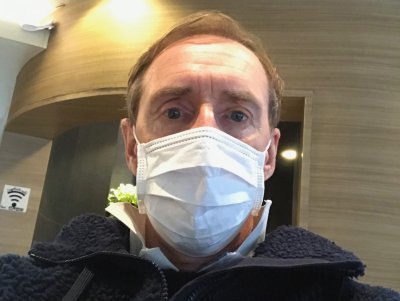
Tony Fordyce (Corpus 1969)
Greetings from Tokyo, where the unofficial lockdown is now partially lifted. In fact, it was never extreme and largely not enforced other than via social stigma (pachinko - slot machine - parlours were 'named and shamed' for staying open) or, as with play parks, museums and sports stadia, temporary closure. Restaurants were encouraged to close early.
My local area of Tokyo has functioned pretty much as normal, although mask wearing is virtually ubiquitous and social distancing is the norm (both are common in Japan anyway). Offices and commuter trains were at about 40% capacity (many companies don't know how to work remotely), but during the recent 8 day Golden Week holiday period, travel was down 95%, with trains, planes and roads almost empty.
COVID-19 infections are still remarkably low in number (as are the numbers of tests), but somehow Japan has, so far, avoided the extreme conditions experienced in many other countries.
Lucy Tibbatts (Emmanuel 1991)
My day as a GP has changed dramatically to spending most of my time telephone and video consulting with an occasional visitor to the premises. Remote triage feels laden with risk as well as making therapeutic connections harder. Impressed by the tech-savvy elderly I have been dragged into learning new technology. It has been an exhausting process keeping up with the latest medical knowledge of COVID. A constant bombardment of 'reflections' and guidance arrives while the really useful information has come via informal channels. Reshaping services on the hoof and daily changing staff due to sickness has been a challenge. Working in PPE is tiring and with a tendency to steam up. This a marathon, the team is tired yet we worry about a second wave in the SouthWest once the visitors return. Watching news items on those unable to go to work I prefer my lot I think.
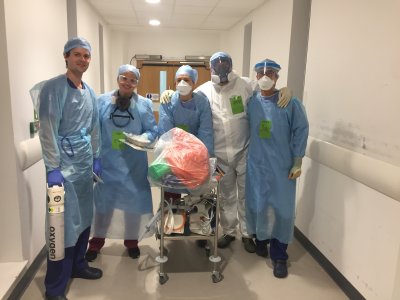
Ivan Wong (Christ's 2005)
Since the first COVID19 patient was admitted to Northwick Park Hospital on 3rd March 2020, a further 260 COVID-19 patients were admitted to our Intensive Care Unit to date.
COVID-19 causes severe lung infection. Dangerously low oxygen level swiftly develops, which kills in minutes if untreated. To save the lives of these critically unwell patients, we created a dedicated intubation team to provide round the clock intensive care including the use of ventilator. Intubation is a high risk procedure that involves insertion of a breathing tube in the windpipe followed by connection to a ventilator for artificial ventilation. During intubation, patients can develop life threatening complications while doctors are exposed to COVID-19 virus.
Our team of over 50 specialists in anaesthesia and intensive care is on duty to provide the right care to anyone who needs it. Together with other medical professionals who work with us, many lives were saved.
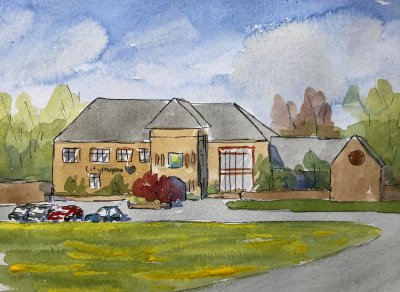
Fiona Rawlinson (Murray Edwards 1982)
I am a palliative care consultant in Cardiff and Reader/Programme Director at Cardiff for postgraduate palliative medicine. Lockdown meant cancelling our 30 year celebration but we continue to connect and support our international postgraduate students in their distance learning studies. As a doctor I don PPE and visit people at home. I create and share learning material for communication skills from behind PPE. We zoom with our children and our elderly parents who are shielding. To destress I paint and write poetry and have started a 'covid tapestry’ of verse. We've been raising money for our palliative care team - people have rowed, run, baked...I have painted 26 pictures. Lockdown has been a time for volunteering work to support colleagues and deep reflection. It's 38 years since A levels and starting at New Hall - I'm continually empowered by all I learnt and how I learned it at Cambridge.
Martyn Trotma (Trinity 1958)
I am helping a privatte health centre in Togo where I now live. It is hoped that the size of the health centre will be made bigger. I have helped a health centre in Bénin to survive with various elements of assistance.
Beth Glanville (Homerton 2002)
I am a Psychotherapist with Transport for London, where myself and my colleagues work therapeutically with many front line workers. Our usual clinical remit is to deliver therapeutic interventions to employees following incidents of trauma at work, but since the pandemic we are also supporting staff experiencing significant mental distress at this time. Typical referrals since lockdown commenced include those struggling with increased anxiety and/or depression; those who have experienced traumatic loss due to COVID-19; individuals who have been assaulted, including spat at, while on duty, and those experiencing re-triggering of previous trauma. I am also co-editor of the online journal Contemporary Psychotherapy. Our upcoming edition will include the section ‘Reflections on working at the time of COVID-19’, where psychotherapists share experiences of the impact of the pandemic, and remote working, on their practice, and potential implications for the future of their own work, and for our profession overall.
Philippa Young (née Cantrell, Queens' 1985)
As a consultant breast radiologist during COVID-19, I have had to reorganise breast cancer services taking the clinics off from NHS COVID hospital sites to other medical facilities. Trying to maintain capacity for urgent cancer referrals has been a real challenge. Plus we remain very concerned that the cessation of the cancer screening programmes leading to later presentations of cancer cases and detrimental long term outcomes. The virus is having far-reaching effects beyond the infections it produces.
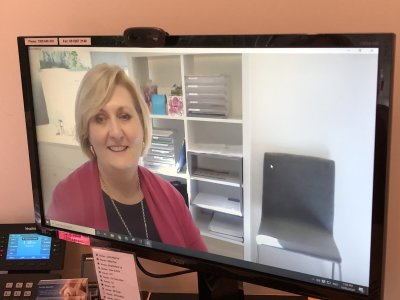
Mary Louise Hull (St Edmund's 2006)
In Adelaide, Australia, public and private hospital services were quickly amalgamated and clinicians repurposed to combat the huge numbers of anticipated COVID-19 cases. All teaching, elective surgery and public outpatient services ceased. We worked from home, consulted by zoom and had teams on site. We couldn’t find hand sanitiser, toilet paper and cleaning equipment, while local manufacturing was rapidly ramped up. Social distancing and online shopping was the norm with a daily walk keeping us sane. After 440 people were infected, 4 people died, and 111,886 tests were done - no new cases occurred and eventually no one was infective. The coffee shops and schools opened, takeaways were available and we could go shopping without be scared of catching COVID-19. People looked after each other - not one health worker died. We are very thankful that we can work and live safely in our local economy.
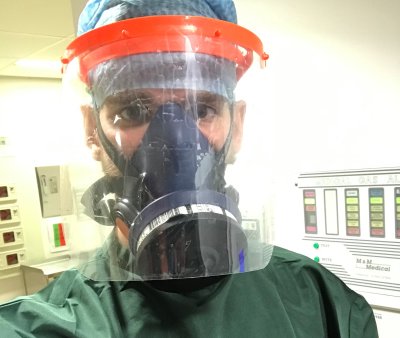
David Firth (Trinity 2009)
I am a junior doctor training in Emergency Medicine. I recently completed a rotation in Intensive Care at Peterborough City Hospital in February. At the end of March I was asked to come back to Intensive Care and I worked an emergency rota on a few days’ notice. We have been running two intensive cares instead of one, now split into patients with and without COVID-19. The struggles have been abundant, and include wearing very uncomfortable Personal Protective Equipment (PPE), working most weekends, frequent night shifts, and living alone in lockdown. I would say the hardest part for everyone is telling families bad news over the phone, including that we would not be able to let family visit dying patients. On a positive note, the team I work with has been inspiring, especially the nurses who are often working under pressure and outside of their comfort zone.
Christine Walls (Newnham 1994)
Lockdown gives me a unique perspective on the value of my Cambridge degree. I am balancing work, home and home school in a way reminiscent of essay crises past. I am appreciating my ability to think back to first principals as I develop enough understanding of endoscope design to help my daughter with her homework. (After much discussion we conclude it's basically a camera on a stick with a light on it.) I am reflecting on the benefits of an academic community as I support my own students in their learning and professional lives. Most of all, in lockdown's early phases, I realise the benefits untold of experiencing life in Russia in 1996/97 as I become shopper and housewife extraordinaire in my quest for eggs and flour!
Roger Coghill (Emmanuel 1958)
I was locked down on the island of Madeira, mid-Atlantic. The average sunshine hours per day are presently twelve. Hence we get lots of UV and I suspect even a little UVC, which is Perhaps that is why Madeira had no COVID deaths at all and only about 90 cases of whom all but 12 have recovered. My first degree was in biology, but I spent 30 years in my own independent lab in South Wales researching Bioelectromagnetics, the science investigating the effects of the physical energies of electricity and magnetism on organic life, and I think it is still the only one of its kind in Europe. Presently we are investigating the possible treatment of COVID using UVC blood irradiation, and if any Cambridge epidemiologists and statisticians are interested in joining my team, just let me know! Madeira will reopen its doors to visitors again on July 1.
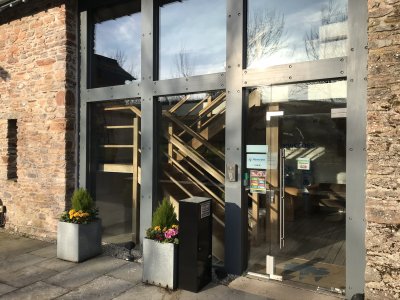
Mark Carey (Selwyn 1986)
After finishing a previous role in December 2019, little did I expect to be interviewed and start work for a national healthcare company in the middle of lockdown. Two months in and most of my work counties to be from my home office, although I have now met four of my many colleagues face to face in one of our local offices. One thing’s for sure - the working world will never be the same again.
Take care and stay safe.
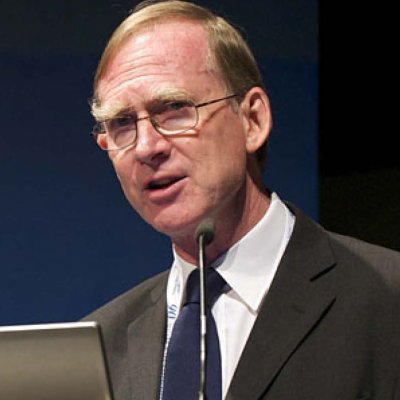
Anthony David Harries (Gonville & Caius 1972)
My work is in international health. With funding support from Bloomberg Philanthropies in USA, I am working with the national authorities in Kenya, Malawi and Zimbabwe to assess how COVID-19 is impacting on tuberculosis case detection rates and HIV testing rates in the capital cities of these countries. We are collecting routine programmatic data from selected health facilities on a monthly basis and are comparing what is happening now with what was happening pre-COVID-19. If TB detection and HIV testing rates do decline, we shall try and intervene to ensure affected people can access these services and therefore do not have their care compromised during this time.
